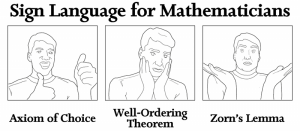There’s an old math joke that goes like this: The Axiom of Choice is obviously true. The Well-Ordering Theorem is obviously false. And, Zorn’s Lemma is just too complicated to be sure.
It is a joke because it is easy to prove that they are equivalent.
 For a month now, I have wanted to turn that joke into a
For a month now, I have wanted to turn that joke into a Sign Language for Mathematicians
picture. I finally got to it this evening. You can see the result on the right.
You can purchase it on a t-shirt or mug over at Zazzle, if you like.
The intuition
I am going to try to paraphrase the Axiom of Choice, the Well-Ordering Theorem, and Zorn’s Lemma to try to give you a sense of why each statement in the joke seems intuitively correct.
Suppose that I have infinitely many boxes. Each box contains one red ball and one blue ball. You can, with or without the Axiom of Choice, pick one ball from each box unless you are colorblind. If you are colorblind, you need the Axiom of Choice to pick one ball from each box even if you don’t care what color that ball is. What a wacky world it would be if a colorblind person could not pick a ball from each of these boxes. So, obviously, the Axiom of Choice should be true.
Suppose you have all of the real numbers from zero to one including both zero and one. If I asked you to give me the smallest number you’ve got, you could hand me the zero. Now, if I asked you to give me the smallest number you’ve got, you’re stuck. What the Well-Ordering Theorem says is that there is some way we could sort your collection of numbers so that no matter how many of them I take away (so long as I don’t take them all), you will never get stuck. It seems crazy that you can just shuffle your collection of numbers to keep me from thwarting you.
As the joke mentions, Zorn’s Lemma is complicated. On the one hand, Zorn’s Lemma says that if you took the genealogy of all people born in the last 8,000 years, then there exists at least one person with no ancestors born in the last 8,000 years. On the other hand, Zorn’s Lemma says that you didn’t need to shuffle your numbers so that you could still give me the smallest number in your hand after I took away the zero.
How it looks on a t-shirt
